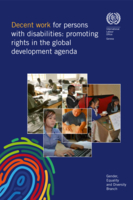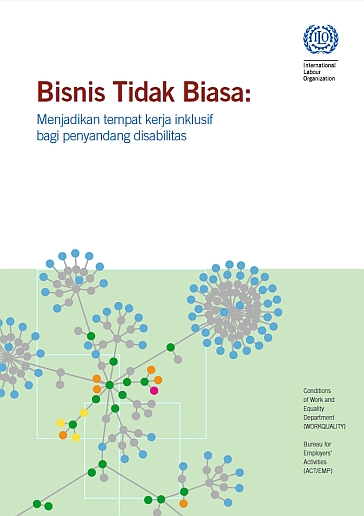Publications
2015
-

Decent work for persons with disabilities: promoting rights in the global development agenda
30 November 2015
-
Domestic work, wages, and gender equality: Lessons from developing countries
30 November 2015
GED Working Paper No. 5/2015 The paper seeks to contribute to a better understanding of developments regarding labour market participation and remuneration in the domestic work sector in comparison with other sectors. It looks at the basic characteristics of female domestic workers, gaps in minimum wage coverage, compliance, and the extent of minimum wage violations. Presenting empirical evidence on labour market inequality along gender lines, the paper discusses the role of minimum wages for reducing gender disparity, questions of regulatory design and enforcement issues.
-
Cash transfer programmes, poverty reduction and empowerment of women in South Africa
23 November 2015
GED Working Paper No. 4/2015 Social protection plays a key role for gender equality and women’s empowerment and social protection floors, in particular, can play a key role in closing coverage gaps for women. Aiming at preventing or alleviating poverty, vulnerability and social exclusion, social protection floors play a key role in economic and social development.
-

i-Flash EVAL Comic Strip, No. 1 - The One with Lessons Learned
16 November 2015
-

Moving towards disability inclusion: Stories of change
09 November 2015
The stories presented in this publication illustrate how the ILO-Irish Aid Partnership Programme through the PROPEL project is promoting employment opportunities for persons with disabilities. PROPEL operates in Ethiopia, China, Indonesia, Viet Nam and Zambia.
-
Facts on disability
04 November 2015
People with disabilities make up an estimated one billion, or 15 per cent, of the world’s population. Approximately 785 million are of working age.
-
Inclusion of people with disabilities in national employment policies
24 September 2015
This note is designed to provide step-by-step support in effectively including women and men with disabilities in the development of national employment policies (NEP) throughout the policy process. It is aligned with the ILO Guide for the formulation of national employment policies which should be read in conjunction with this guide. Further, the resource guide on gender issues in employment and labour market policies gives guidance on how to effectively embed gender dimensions in NEP development.
-

ILO and disability inclusion
24 September 2015
The ILO promotes equality of opportunity and treatment for persons with disabilities in the world of work. Access of persons with disabilities to decent work is important both as an essential right and in terms of the economic advantages it brings. To achieve this goal, the ILO works to increase the employability of persons with disabilities, to support employers becoming more inclusive and to promote enabling legislative and policy environments.
-
Indigenous Persons with Disabilities: Access to Training and Employment
28 August 2015
This paper was prepared as a resource for a panel discussion organized by the ILO in cooperation with the Government of Australia during the 14th Session of the United Nations Permanent Forum on Indigenous Issues on 23 April 2015 in New York.
-

Indigenous Peoples in the World of Work: Snapshots from Asia
07 August 2015
International development enters a new phase in 2015 with the adoption of the Sustainable Development Goals and a strong commitment to eradicate poverty and tackle rising inequalities. Being one of the most vulnerable sections of the population, a focus on indigenous peoples is crucial as a new framework for development takes form. Addressing poverty and inequalities will also require attention to their specific needs particularly with regard to the world of work. Engaging with indigenous peoples in the world of work, which is marked by particular problems, ranging from loss of livelihoods to increasing dependence on the informal economy, is among the initial and crucial steps in that direction. This Brief seeks to contribute to debates on these issues and highlight related aspects pertaining to the situation of indigenous peoples. It also draws on examples of policies and measures in a number of countries in the Asia-Pacific region.
-

Reporting on disability: Guidelines for the media
28 May 2015
These Guidelines are intended as a tool for professional communicators to promote inclusiveness and the fair and accurate portrayal of people with disabilities.
-
PRIDE at work: A study on discrimination at work on the basis of sexual orientation and gender identity in Thailand
14 May 2015
GED Working Paper No. 3/2015
-

The motherhood pay gap: A review of the issues, theory and international evidence
06 March 2015
Evidence that mothers suffer a wage penalty over and above the penalty for being a woman raises concerns not only for gender equality but also for the capacity of societies to manage a sustainable balance between their economic aims of active female participation in paid work and the social aims of providing a fair distribution of income to support the reproduction and rearing of children. These concerns underpin ILO Conventions designed to combat inequality in women’s position in paid employment, especially associated with motherhood status.
-

The motherhood pay gap: A review of the issues, theory and international evidence
06 March 2015
Evidence that mothers suffer a wage penalty over and above the penalty for being a woman raises concerns not only for gender equality but also for the capacity of societies to manage a sustainable balance between their economic aims of active female participation in paid work and the social aims of providing a fair distribution of income to support the reproduction and rearing of children. These concerns underpin ILO Conventions designed to combat inequality in women’s position in paid employment, especially associated with motherhood status.
-

Respecting human rights in the implementation of the VCT initiative: operational guidelines
02 March 2015
This publication provides guidance on the protection of human rights in the implementation of the VCT@Work initiative — Voluntary Confidential Counselling and Testing initiative for workers. The guidelines have been developed by the Global Network of People Living with HIV (GNP+) with support from the International Labour Organization (ILO), in consultation with the Inter-Agency Task Team on HIV and AIDS Workplace Policy/Programmes and Private Sector Engagement.
-

Women in Business and Management: Gaining momentum
12 January 2015
This report brings together available data and ILO statistics to provide a comprehensive, up to-date and global picture of women in the business world and in management positions.
2014
-
Achieving equal employment opportunities for people with disabilities through legislation: Guidelines
25 November 2014
These guidelines reflect the reappraisal of disability as a human rights issue. Intended for policy-makers and drafters of legislation, they have been developed with a view to assisting in improving the effectiveness of national laws concerning training and employment of disabled persons, as part of an ILO Project "Promoting Rights and Opportunities for People with Disabilities in Employment through Legislation”.
-

Maternity Protection in SMEs: An international review
20 October 2014
This report reviews the key international literature on the outcomes of maternity protection in small and medium-sized enterprises (SMEs). It also addresses the questions of how, to what extent and under what conditions maternity protection in SMEs can generate positive outcomes for enterprises as well as broader society, considering implications for policy and practice.
-

Business as unusual: Making workplaces inclusive of people with disabilities
03 October 2014
-

Leveraging the cooperative advantage for women’s empowerment and gender equality
15 September 2014
This note is a part of the ILO COOP Cooperatives and the World of Work Series.